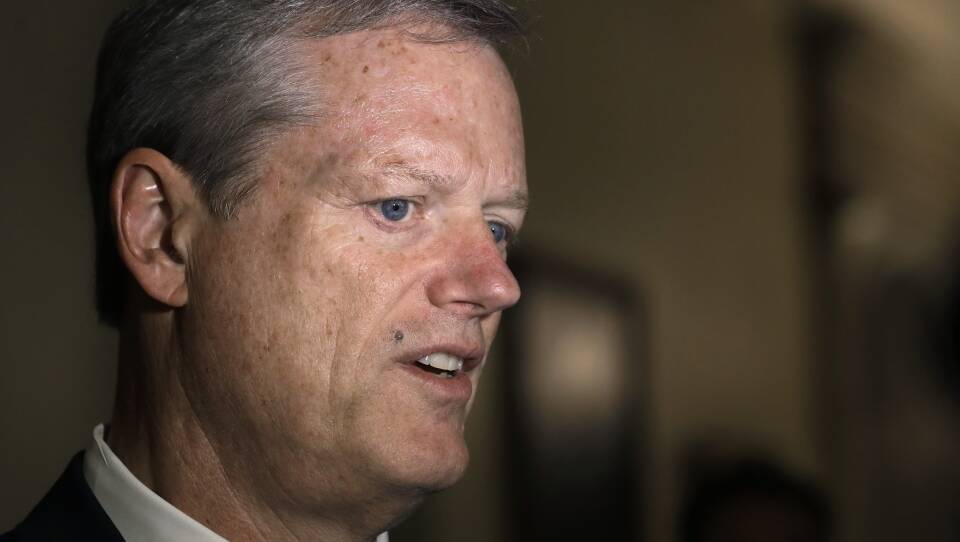With more people getting vaccinated and state coronavirus metrics largely heading in the right direction, Governer Charlie Baker is moving to ramp up vaccine distribution and reopen businesses. GBH Morning Edition host Joe Mathieu spoke with GBH News State House reporter Mike Deehan about his interview with the governor on a number of issues surrounding the pandemic. The transcript below has been edited for clarity.
Joe Mathieu: How's the governor see the recent drop in his approval rating? I notice he's been sitting down with a few people lately, and he went from approval in the 70s to the low 50s in just a few weeks.
Mike Deehan: Yeah, exactly. And what Baker told me when we did sit down yesterday is he attributes it to the pandemic fatigue, and said that everybody in public life — leaders, elected officials during the pandemic — they're all faced with the challenges and faced with voters who might be losing patience during this pandemic now a year old, especially now that vaccines and reopenings are adding some complications to the way the government is running the pandemic for the last few months and as we see the light at the end of the tunnel, so to speak, when it comes to vaccines. Here's exactly what Baker had to say when I asked him directly to react to those poll numbers.
Gov. Charlie Baker clip: I think everybody's anxious for the pandemic to be over. I am. I don't know why everybody else wouldn't be there.
Deehan: So he sees that voters want to see the state's vaccination plan ramp up and they want life to return to something like a pre-pandemic normal. That's what he attributes those dropping numbers to, and he says that he's delivering on that now through the vaccination and through the reopening.
Mathieu: Let's talk about the reopening, then. We just entered Phase 4 here [in Massachusetts] with COVID infection rates no longer decreasing. What did the governor have to say about these sort of two crosscurrents?
Deehan: Yeah, it's a bit of a plateau as far as infection rates right now. He said that the new reopening changes are part of the gradual system that the state has been doing all along — just step one of Phase 4. And he said that the state is in a very different place than it was for most of last year. With three million vaccine doses handed out and over a million people actually fully vaccinated, a lot of the older people and sicker people that were concentrated on earlier have been vaccinated by now. So now the population that's carrying that virus around is younger and less likely to be hospitalized. That doesn't mean that the virus is not a threat or less of a threat, but it does mean that we're dealing with a much different population. And going into the hospital for this disease is much different than it would be a year ago when there are 65-, 75-year-olds being affected.
Mathieu: We've talked a lot about hesitancy about getting the vaccine. We just heard from NPR on this, actually. To what end is the governor working to make sure people want to take it once it's more available?
Deehan: Yeah, the state is engaging with local health officials and providers at the ground level. They're building out education campaigns about the effectiveness of the vaccines. There's also going to be a door-knocking program the governor mentioned that will bring that message straight to people who may have been eligible for some time but haven't got the vaccine yet. And I spoke to Baker about this, and he's confident that those people who are hesitant will come around once they see that things are safe. Here's what he said about that.
Gov. Baker clip: Almost all the data among the people who are hesitant is that they're not permanently hesitant, they just don't want to go first. And what they really want is to hear from a family member, a friend, a coworker, a doctor that they know. Somebody in the medical community.
Mathieu: And Mike, what progress is Governor Baker making on what he's been calling the "Future of Work?" I know there's a big review underway right now. Are workplaces going to be looking drastically different, not to mention his own workplace there in the State House?
Deehan: Exactly. And that is an effort that Baker has kept in mind really throughout this whole pandemic for the last year. It's been a thread through a lot of what he's done. But we haven't really seen what it's going to mean, what it's going to come across as far as state policy. Baker is talking with unions and he's talking with his own employees about changes that might need to be made. He doesn't expect a lot of state workers to come back to work in person anytime soon, and so he's going to continue working with business leaders and employers to see how those changes will work. But he is really aware that Massachusetts industries and the economic advantages that we have could be damaged if things change too much. People want to live in different places [and] they want to commute differently, and Massachusetts doesn't anticipate that. Here's what he told me.
Gov. Baker clip: My great fear here is that if we don't pay attention to some of this, we may end up letting some really bad things happen to people and to communities that we would have been able to solve for if we'd been a little more focused on the fact that things weren't just going to be the way they always were before.
Deehan: So there you have Baker taking on that challenge. We'll see what he comes up with, but as of right now, we don't actually know what big changes at the state level are going to accompany these big changes in the workforce.





